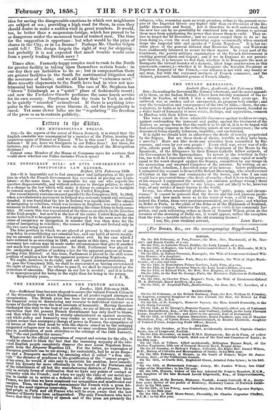THE FRENCH ALLY AND THE FRENCH RULER.
Loudon, 15th February 1858. Sue—Sufficient time has now elapsed to assure the valiant French Colonels of the detestation with which Englishmen of all grades regard attempts at assassination. The British press has been far more unanimous than even the Imperial army in denouncing any recourse to individual violence as a means of furthering even the beat interests of humanity Having therefore discharged this duty to the best of our ability, we are at liberty to affirm our conviction that the present French Government has only itself to blame, and that while our laws will be strictly administered as against assassins, and while policy and humanity may render us averse to a renewal of the violent scenes that accompany change of power in France, the sympathies of all lovers of their kind must be with the objects aimed at by the unhappy misguided refugees now in exile, however we may condemn their jesuitical plea in justification of such atrocities as the attempt of the 14th January, that "the end justifies the means." Whatever be the official expressions of respect and esteem for the ally, it would be absurd to blink the fact that the reasoning majority of the edu- cated English people completely dissever the man Louis Napoleon Bona- parte from the Emperor Napoleon III. For the latter, no expression of European gratitude can be too strong; for undeniably, had he as an Empe- ror and a Bonaparte sacrificed by assuming what is called " a firm atti- tude" the dictates of prudence to the gratification of the " amour propre " of his army, he would, if able only to maintain his position, have consoli- dated his dynasty far more effectually in the hearts of the Parisians and of the inhabitants of all but the manufacturing districts of France. It is only in certain forms of civilization that we have any points of contact or Sympathy with the French ; and when we apply the rules of our social sys- tem to enable us to arrive at a definite idea of the difficulties that beset France, we find that we have misplaced our sympathies and misdirected our energies. Thus, we in England commiserate the French with a press fet- tered by the most rigorous censorship. There are not at present five hun- dred people in Paris and all France who will be even aware that the last glimmer of liberty has been extinguished. The only Frenchmen who have towu that they value liberty of speech and of the press are precisely tho refugees, who, reasoning upon no weak premises, refuse to the present wen- - pier of the Imperial throne any higher title than ex-President of the Re- public Democratic and Social. Let it therefore be well understood, that the new law can by no possibility be construed into an attempt to prevent these men from questioning the power that dooms them to exile. They re- fuse to forget the 2d December ; and we cannot compel them to do so : far from doing so, even the most influential organ occasionally when annoyed drops the Imperial title and speaks of " Louis Napoleon." It is but an- other phase of the general distrust that Messieurs Morny and Walewski have assiduously laboured to secure for their master. In every part of the Continent, the purely military organization of the French Government is exciting general alarm and disgust ; and if we in England do not partici- pate therein, it is because we feel that, whether it be Bonaparte the man or Bonaparte the virtual founder of a dynasty, (that huge anachronism in this nineteenth century,)—whether it be Bonaparte the Socialist President or Napoleon Emperor of the French,—our alliance is not with any family er any man, but with the repressed instincts of French commerce, and the
chained, pinioned, fusilladed genius of French liberty. G.


































 Previous page
Previous page